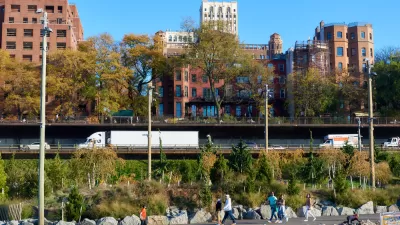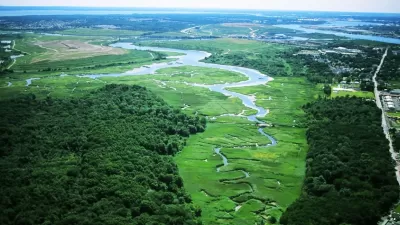As a new park near the Brooklyn Bridge gradually opens in New York, the role it plays in public life in the city is already evolving.
Urban Omnibus reviews the project and discusses its developmental future.
"[T]he planning of Brooklyn Bridge Park explicitly acknowledges that the maintenance costs over time will far outweigh the construction costs. The proposed solution - up to 20% of the park land can be developed to generate revenue - led to fierce debate (and a court case that argued a violation of the public trust doctrine). In 2002, four years after the masterplanning process began, Mayor Bloomberg and Governor Pataki signed an agreement to provide the land and to create the Brooklyn Bridge Park Development Corporation (BBPDC) as a subsidiary of Empire State Development Corporation (ESDC). As the park's developer (and MVVA's client) the BBPDC would also develop commercial properties to fund maintenance and operational needs. Twelve days before Pier 1 opened, the nature of this city-state partnership changed dramatically. Governor Paterson relinquished the State's stake in the project, effectively handing control of the process to the City.'
FULL STORY: Park as Process: Brooklyn Bridge Park

Planetizen Federal Action Tracker
A weekly monitor of how Trump’s orders and actions are impacting planners and planning in America.

Maui's Vacation Rental Debate Turns Ugly
Verbal attacks, misinformation campaigns and fistfights plague a high-stakes debate to convert thousands of vacation rentals into long-term housing.

Restaurant Patios Were a Pandemic Win — Why Were They so Hard to Keep?
Social distancing requirements and changes in travel patterns prompted cities to pilot new uses for street and sidewalk space. Then it got complicated.

In California Battle of Housing vs. Environment, Housing Just Won
A new state law significantly limits the power of CEQA, an environmental review law that served as a powerful tool for blocking new development.

Boulder Eliminates Parking Minimums Citywide
Officials estimate the cost of building a single underground parking space at up to $100,000.

Orange County, Florida Adopts Largest US “Sprawl Repair” Code
The ‘Orange Code’ seeks to rectify decades of sprawl-inducing, car-oriented development.
Urban Design for Planners 1: Software Tools
This six-course series explores essential urban design concepts using open source software and equips planners with the tools they need to participate fully in the urban design process.
Planning for Universal Design
Learn the tools for implementing Universal Design in planning regulations.
Heyer Gruel & Associates PA
JM Goldson LLC
Custer County Colorado
City of Camden Redevelopment Agency
City of Astoria
Transportation Research & Education Center (TREC) at Portland State University
Jefferson Parish Government
Camden Redevelopment Agency
City of Claremont





























